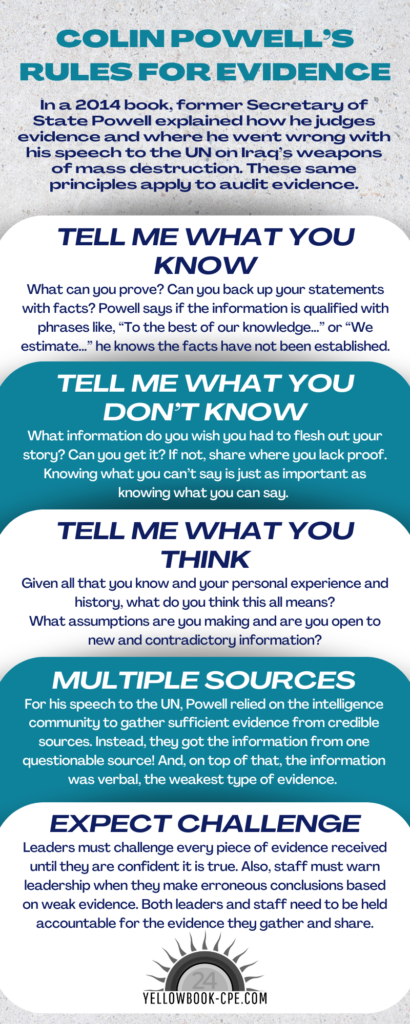Colin Powell’s Rules for Evidence
In a 2014 book, former Secretary of State Colin Powell explained his rules for evidence and where he went wrong with his speech to the UN on Iraq’s weapons of mass destruction. These same principles apply to audit evidence.
Tell me what you know
What can you prove? Can you back up your statements with facts? Powell says if the information is qualified with phrases like, “To the best of our knowledge…” or “We estimate…” he knows the facts have not been established.
Tell me what you don’t know
What information do you wish you had to flesh out your story? Can you get it? If not, share where you lack proof. Knowing what you can’t say is just as important as knowing what you can say.
Tell me what you think
Given all that you know and your personal experience and history, what do you think this all means? What assumptions are you making and are you open to new and contradictory information?
Multiple sources
For his speech to the UN, Powell relied on the intelligence community to gather sufficient evidence from credible sources. Instead, they got the information from one questionable source! And, on top of that, the information was verbal, the weakest type of evidence.
Expect challenge
Leaders must challenge every piece of evidence received until they are confident it is true. Also, staff must warn leadership when they make erroneous conclusions based on weak evidence. Both leaders and staff need to be held accountable for the evidence they gather and share.
Want to learn more about audit evidence?
I suggest this short video course entitled Choosing the Best Audit Test Plus Audit Documentation. You will learn more about the three types of evidence and qualities of good audit test while earning 2.5 hours Yellow Book CPE hours.
Need more in-depth training? I invite you to join me for one of my most popular classes, the Virtual Audit Bootcamp scheduled for September 30-October 4. Participants will learn how to support their conclusions and findings with evidence. Also, we’ll explore each phase of conducting a government audit while learning how to comply with significant Yellow Book and IIA standards. And there’s a bonus! Develop your interviewing skills and earn 7 extra hours of CPE at your own pace with a complimentary self-study course, Interviewing Skills for Auditors.


 Yellowbook-CPE.com is registered with the National Association of State Boards of Accountancy (NASBA) as a sponsor of continuing professional education on the National Registry of CPE Sponsors. State boards of accountancy have final authority on the acceptance of individual courses for CPE credit. Complaints regarding registered sponsors may be submitted to the National Registry of CPE Sponsors through its website:
Yellowbook-CPE.com is registered with the National Association of State Boards of Accountancy (NASBA) as a sponsor of continuing professional education on the National Registry of CPE Sponsors. State boards of accountancy have final authority on the acceptance of individual courses for CPE credit. Complaints regarding registered sponsors may be submitted to the National Registry of CPE Sponsors through its website: